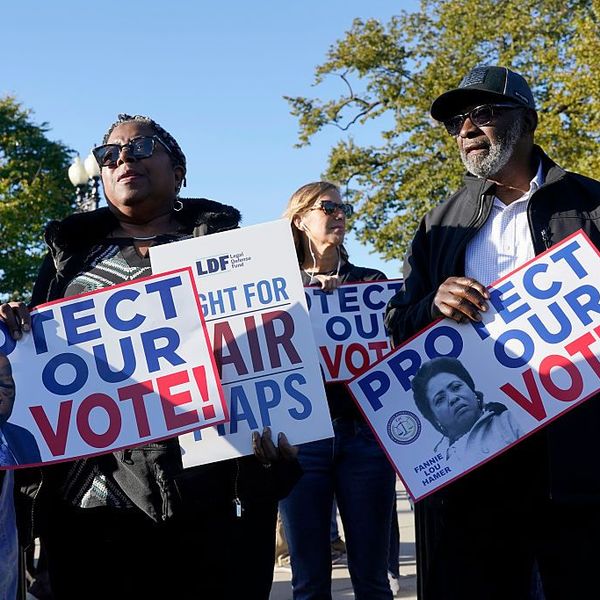A coalition of 10 major organizations of state and local government officials just sent a letter asking -- or, rather, effectively begging -- Congress to finally do its job and reauthorize No Child Left Behind.
It is a sharp reminder of the stunning failure of Congress over years to find the legislative will to pass a new version of the Elementary and Secondary Education Act, known in its current form as No Child Left Behind.
The letter (full text below) from the State and Local Governance Coalition is something else, too: a study in the art of diplomatic language.
For example, where the letter says: "We deeply appreciate the leadership you have already shown, and realize that completing a complex piece of legislation like ESEA is a difficult task," we can imagine that the authors might really have wanted to say something like this:
"We cannot for a second appreciate the unfathomable lack of leadership you have already shown on this issue and realize, sadly, that you can't even get simple legislation passed much less such a complex piece of legislation like ESEA. If it were our call, we'd recall you all (or at least a ton of you)."
Unquestionably the people who signed the letter -- including the heads of the National Governors Association, The Council of State Governments, The National League of Cities, the National School Boards Association, and the U.S. Conference of Mayors -- would take vociferous objection to my description of their effort.
They would say -- and they wouldn't be wrong -- that the May 3 letter to congressional leaders was in a series they have sent with their best collective thinking on legislative educational priorities.
Indeed, they sent a letter on Feb. 6, with their thinking of how Congress should proceed to "fix and reauthorize" the ESEA by the time the next school year begins. Congress, naturally, jumped to attention.
The No Child Left Behind Act actually expired on Sept. 30, 2007. Congress passes laws with the intent that they will expire after a certain period of time, most often five years. This is supposed to force Congress to update and/or fix a law, with some history of implementation to back it up. However, if Congress somehow doesn't get around to taking a new look at a law, its authority doesn't go away; it stays intact until a new law is passed. Thus after most people who pay attention to education issues have realized the law is desperately flawed, it still is driving what goes on in schools, at least in those minority of states where the Obama administration hasn't approved a waiver from the worst parts of NCLB.
So now we have another letter (see full text below) from the coalition to Congress, written in artful language that belies the extraordinary frustration many feel at the refusal of federal legislators to do what they are supposed to.
Here's another example of what's in the letter vs. what might have been:
The letter's first paragraph actually says:
"As state and local officials committed to ensuring that 49 million American school children are prepared for success in life, we urge you to complete the long overdue reauthorization of the Elementary and Secondary Education Act (ESEA). The House Education and the Workforce Committee and the Senate Health, Education, Labor and Pensions Committee have passed bills, and the House and Senate need to move their respective bills to the floor for action if there is any change of having reauthorization accomplished before the 112th Congress adjourns."
What it might really mean:
"As state and local officials committed to ensuring that 49 million American school children are prepared for success in life, we are really sick of telling you to stop ignoring the 49 million American school children are we are supposed to be preparing for success in life. You are embarrassingly late in reauthorizing the Elementary and Secondary Education Act (ESEA). The House and Senate committees that deal with this issue have passed bills (they have enormous problems, but credit where credit is due, some bills were passed) and now it's time for the House and Senate to take these up and compromise for the benefit of those 49 million American school children. If you don't do it really really soon, the 112th Congress will have lost its chance, though it is hardly the only thing the 112th Congress botched."
The letter actually says:
"Without changes to NCL B, many states turned to the immediate flexibility offered by the U.S. Department of Education through the waiver process. However, waivers only provide temporary relief from specific provisions of the law and leave states that face challenges in meeting the reform criteria for obtaining a waiver struggling to meet the unreasonable requirements of NCLB. Federal policy must not set up a system that disadvantages some states and some students."
What it might really mean:
"Since you failed to do your job and rewrite NCLB so that schools wouldn't be punished for reaching the impossible goal of 100 percent proficiency in reading and math by 2014, states are now turning to NCLB waivers offered by the Education Department which are, in themselves, a migraine headache. They provide only temporary relief from specific provisions of the law, and though they do eliminate some of the onerous mandates of the former Bush administration, they add new mandates from the Obama administration that schools find equally or even more onerous. In fact, Obama's reform policies have set up a system that leaves some state and some students disadvantaged, and while it is the administration's fault, you, Congress, aren't blameless either. In fact, if you had done your job, we wouldn't be in this mess."
Here's the full text of the letter that was actually written and sent to congressional leaders from the State and Local Governance Coalition:
Dear Speaker Boehner, Senator Reid, Senator McConnell, and Representative Pelosi:
As state and local officials committed to ensuring that 49 million American school children are prepared for success in life, we urge you to complete the long overdue reauthorization of the Elementary and Secondary Education Act (ESEA). The House Education and the Workforce Committee and the Senate Health, Education, Labor and Pensions Committee have passed bills, and the House and Senate need to move their respective bills to the floor for action if there is any change of having reauthorization accomplished before the 112th Congress adjourns.
ESEA's last reauthorization as the No Child Left Behind Act (NCLB) had a commendable intent -- to identify the unmet needs of all children in our schools and to promote education -- but was also flawed. It shifted too much control away from state and local elected officials, diluted the impact of federal resources, and relied on a method of identifying academic progress that focused on failure instead of rewarding excellence. Ten years later, it is past time to write the law and correct its mistakes.
Policymakers at the state, local and school district level need a resolution to these issues. We need certainty in federal policy at a time when we are struggling with reallocating scarce education resources to fund what works. We need federal policy that instead of focusing on process and compliance, allows for state and local innovation.
Without changes to NCL B, many states turned to the immediate flexibility offered by the U.S. Department of Education through the waiver process. However, waivers only provide temporary relief from specific provisions of the law and leave states that face challenges in meeting the reform criteria for obtaining a waiver struggling to meet the unreasonable requirements of NCLB. Federal policy must not set up a system that disadvantages some states and some students.
We deeply appreciate the leadership you have already shown, and realize that completing a complex piece of legislation like ESEA is a difficult task. By moving these bills to conference, Congress can act in a bicameral and bipartisan fashion to craft an ESEA reauthorization that secures the reforms necessary to ensure our nation's children have the best chance to succeed.
To this end, we urge all members of Congress to work with you and prioritize our nation's education system as "must pass" legislation. We stand ready to work with you to complete ESEA reauthorization so that every state, district, school, and student may benefit from a federal elementary and secondary education law that works.
Sincerely,
Dan Crippen, executive director of the National Governors Association
David Adkins, chief executive officer and executive director for The Council of State Governments
Donald J. Borut, executive director of the National League of Cities
Robert J. O'Neill Jr., executive director, International City/County Management Association
Gene Wilhoit, executive director, Council of Chief State School Officers
William T. Pound, executive director, National Conference of State Legislatures
Larry E. Naake, executive director, National Association of Counties
Tom Cochran, CEO and executive director, United States Conference of Mayors
James Kohlmoos, CEO and executive director, National Association of State Boards of Education
Anne L. Bryant, executive director, National School Boards Association

